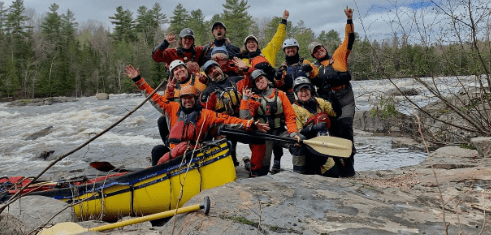NWT students will soon have a unique opportunity to learn how to help protect the environment of the North, as the Protecting Our Lands Camp is now taking applications for participants.
This program is being organized by Northern Youth Leadership, a non-profit group that works to help educate youths to become leaders through various on-the-land training programs. This latest camping event will see the youths go on a multi-day long canoe trip starting in the Deh Gáh Got’ı̨ę First Nation, and ending in the Łı́ı́dlı̨ı̨ Kų́ę́ First Nation.
Dr. Steph Woodworth, the Project Director at Northern Youth Leadership, shared that while on this journey, the youths will be learning about subjects such as permafrost monitoring, wildlife and river monitoring, water quality, and fish health. These subjects will also be incorporating traditional lessons from the Łı́ı́dlı̨ı̨ Kų́ę́ Indigenous Guardians.
“They’re going to be teaching the youth what they do out on the land to protect, to monitor, understand the river health, the health of the wildlife, as well as the fish. The youth will be learning from them, hands on, about how they integrate the monitoring practices with Indigenous knowledge.”
The youths will be making stops at a number of cultural and historical sites, including Axe Point, Red Knife River, Browning Island, and Jean Marie River.
“We’re going to share why these sites are culturally and historically important. We’re going to start the program by offering gifts to the land with a water ceremony, asking for safe passage, and we’ll be talking about the history of this area as we travel through it, and why the river is so important to the Dehcho.”
This camp will also be partnering with the Nasa Above program. The two groups have worked together on previous projects, where they integrate each other’s research practices to diversify their findings.
“So we’re going to be doing that at this camp by working with our Nasa Above team with the Indigenous Guardians and finding ways that the youth can understand how the land and rivers and waterways are all protected.
“We’re going to be using drone footage with the Guardians, and then we’re going to be collecting samples within the wetlands with the Nasa research data sheets, so the youth will be able to explore the different ways that these two practices come together and understanding what’s happening to the land and ways that they can protect it.”
Any youths between 11 and 16 who wish to sign up for the camp can do so online by visiting www.northernyouth.ca/apply. Donations to the non-profit organization can also be made on their website.





